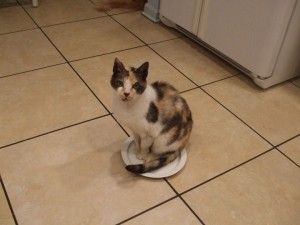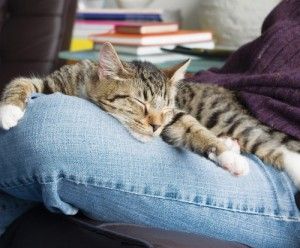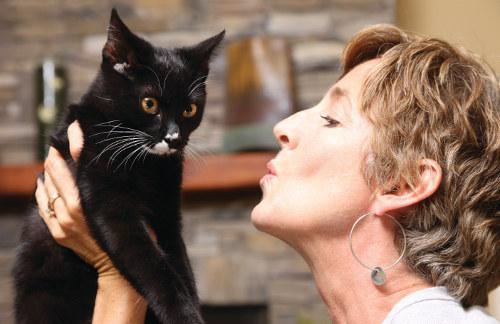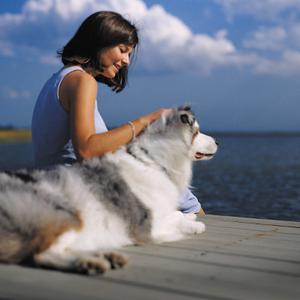Watching your new kitty zip across the room in pursuit of the magical red laser dot, you thought she’d be a kitten forever. Now your aging cat spends more time napping than playing and doesn’t seem as interested in eating her food as you’d like. Most cats start to slow down as they age. Some get sick or need extra help to remind them to eat, drink, or clean themselves. Get answers to frequently asked questions about your cat’s golden years. 
When would my cat be considered a senior citizen?
Let’s put it in human terms. When your cat turns 10, she can join the AARP. She might start to feel her age and slow down a little. When she turns 12, she can retire. She’s officially a senior cat. Many cats live to be 15-20 years old, depending on their health and breed.
Does my senior cat need a different diet?
Not every senior cat needs to change foods. Senior formula dry foods aren’t significantly different from adult formulas, so let your cat eat her current food if she likes it. Your vet can help you choose the right food for your cat depending on her health. For example, glucosamine supplements reduce pain from arthritis, and a special K/D wet food can keep your cat’s kidneys in tip-top shape.
Senior cats can become dehydrated more easily. You can help your senior cat by supplementing her meals with wet food or tuna juice. Cat fountains are another great way to make sure your cat gets enough to drink every day. Some senior cats don’t eat as much as they used to.
Dental disease is a common cause, so make sure your cat’s teeth and gums look healthy. Don’t be afraid to ask your vet about dental cleanings. Senior cats in good health can undergo dental anesthesia, especially for severe periodontitis. You can encourage your cat to eat and keep her teeth healthy at the same time with food toppings like indigo™ Fresh Dental Sauce.
What health changes should I watch out for?
Cats age like people do. They can lose their hearing, eyesight, and memory. Symptoms of senility include wandering, meowing, disorientation, and avoiding social interaction. Older cats also become stressed more easily. You can help your senior cat by maintaining routines and introducing change slowly.
Some diseases tend to affect older cats more than younger cats. It’s often hard to tell if your cat is sick. Cats are good at hiding pain, and many of these symptoms seem like normal aging changes. For example, if your cat stops using the litter box it could be because she has developed diabetes, which causes her to use the bathroom more. Since the box is getting dirtier faster, she finds other places to relieve herself. Here are some common and uncommon symptoms of common age-related diseases:
- Arthritis – decreased activity, aggression, litter box problems, mobility issues, stiffness
- Hyperthyroidism – hyperactivity, spraying, weight loss, greasy coat, drinking more, eating more, vomiting
- Diabetes – drinking more, peeing more, litter box problems, weight loss
- Inflammatory bowel disease – using the bathroom more, vomiting, constipation, litter box problems, weight loss
- Cancer – lumps, sores, eating less, difficulty peeing, aggression, weight loss
- Kidney failure – litter box problems, weight loss, vomiting, decreased activity, constipation, drinking more
Do I need to do anything special to care for my senior cat?
- Brush your cat more often. Older cats can have trouble grooming themselves. Brush your cat regularly to improve her coat and circulation. It’s also a great time to give her a quick physical and look for any dental problems, lumps, or changes in her coat.
- Don’t forget annual vet checks. Your vet can test for diseases and help prevent problems later. If you notice any changes in your cat’s behavior, you can bring her in sooner. Some vets recommend a 6-month checkup cycle after your cat turns 10.
- Watch for weight changes. Overweight cats have a higher chance of getting diseases. Now’s the time to help her lose weight if she starts to get chubby. If your cat is losing weight and you haven’t changed her diet or exercise, this could be a symptom of an underlying disease.
- Give her easy access to everything. Make it easier for her to get in the box by adding a ramp or getting a box with lower sides. Put her food and water on the ground, and make sure she doesn’t have to use stairs to eat, drink, or use the bathroom.
Should I adopt a senior cat?
Senior cats are great if you’re looking for a feline companion with a stable, established personality. Seniors are more likely to sit in your lap than attack your toes, and they often know proper house etiquette like peeing in the litter box instead of on the carpet.
personality. Seniors are more likely to sit in your lap than attack your toes, and they often know proper house etiquette like peeing in the litter box instead of on the carpet.
A senior cat’s personality is pretty much fixed; you don’t have to worry if she’ll be as cuddly at home as she is at the shelter. On the other hand, that kitten in the shelter might turn into a completely different cat when she grows up.
Senior cats are also less likely to be adopted. Many senior cats spend their last remaining years alone in a shelter. Adopting a senior means you’re not only saving a life but you’re also giving that older cat the best care she could get for the rest of her life. If you’re worried about extra medical costs, talk to your local shelter about low-cost vet care and pet insurance.
Have any other tips about caring for senior kitties? Have other questions about seniors? Share them in the comments!





